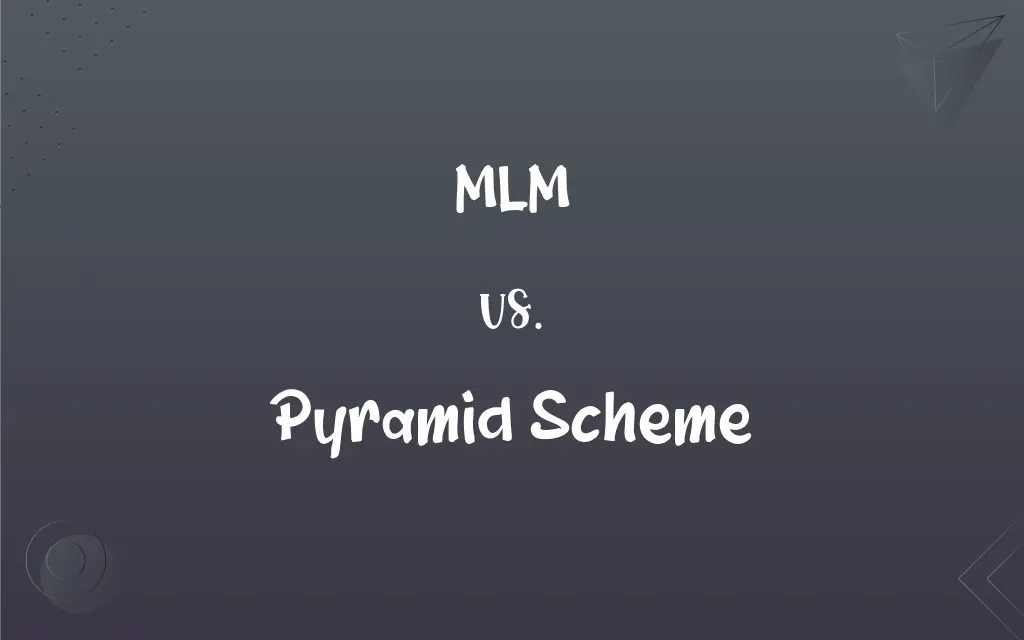MLM vs. Pyramid Scheme: What's the Difference?
Edited by Aimie Carlson || By Janet White || Published on December 2, 2024
MLM (Multi-Level Marketing) is a business model where income is derived from direct sales and recruiting others, while Pyramid Schemes rely primarily on recruitment for profit, often without a legitimate product.

Key Differences
MLM, or Multi-Level Marketing, is a legitimate business strategy that involves selling products or services through a network of distributors. These distributors earn income from their own sales and from the sales made by people they recruit into the business. The focus in an MLM structure is on both sales of products and the building of the sales network. Pyramid Schemes, however, are illegal and focus almost exclusively on recruitment. In a pyramid scheme, the primary way to make money is by recruiting others to join the scheme, with little to no emphasis on selling actual products or services.
One key difference between MLM and Pyramid Schemes is the presence of a genuine product or service. In MLM, the product or service is real and provides value to the consumer, which is where the majority of the revenue should come from. Pyramid Schemes often lack a real, marketable product or service, or if one exists, it's typically used as a front to mask the recruitment-driven nature of the scheme.
MLM companies are regulated and must comply with laws that protect consumers from fraud. They are required to focus on product sales and must offer a buyback policy for unsold inventory. Pyramid Schemes, by contrast, are not concerned with regulations as their business model is inherently fraudulent, focusing on the money paid by new recruits to join the business rather than on a sustainable sales strategy.
The sustainability of the business model is another distinguishing factor. MLM businesses can be sustainable if they focus on product sales to end consumers, including those outside the distributor network. Pyramid Schemes are unsustainable because they rely on an ever-increasing number of recruits to fund returns, which inevitably collapses when it becomes impossible to recruit new members.
MLMs and Pyramid Schemes may appear similar at first glance due to their use of tiered recruitment, the key differences lie in the legality, focus on product sales, and sustainability of the business model.
ADVERTISEMENT
Comparison Chart
Legality
Legal, if focuses on product sales
Illegal due to focus on recruitment without real sales
Revenue Source
Sales of products/services and recruitment
Primarily from recruitment fees
Product Presence
Genuine products/services are central
No product or a nominal product without real value
Sustainability
Potentially sustainable with product sales
Unsustainable as recruitment cannot continue indefinitely
Regulation
Subject to direct sales regulations
Operates outside legal boundaries
ADVERTISEMENT
MLM and Pyramid Scheme Definitions
MLM
MLM involves selling products and recruiting distributors to earn commissions.
I joined an MLM to sell health supplements and build my sales network.
Pyramid Scheme
In Pyramid Schemes, new recruits pay fees that benefit those at the top.
The pyramid scheme collapsed when it ran out of new members to recruit.
MLM
MLMs focus on direct sales and building a network of distributors.
My MLM income comes from both my sales and my team's performance.
Pyramid Scheme
Pyramid Schemes often disguise themselves as MLMs but lack a real product.
The scheme was exposed as a pyramid scheme, not a legitimate MLM.
MLM
MLMs allow individuals to start their own business with a low upfront cost.
Starting my MLM business allowed me to work from home and set my own hours.
Pyramid Scheme
Pyramid Schemes rely on recruiting members for income, without real sales.
He lost money after joining a pyramid scheme that promised quick returns.
MLM
MLM companies offer products or services through a networked salesforce.
I attend MLM meetings to learn better sales techniques and product knowledge.
Pyramid Scheme
Pyramid Schemes are unsustainable and eventually collapse.
Many people were left in financial ruin when the pyramid scheme failed.
MLM
In MLM, distributors earn from their sales and their recruits' sales.
Success in MLM requires strong sales and recruitment skills.
Pyramid Scheme
Joining a Pyramid Scheme usually results in financial loss for most members.
Despite promises of wealth, most participants in pyramid schemes lose money.
FAQs
What defines an MLM?
A business model involving direct sales and earning from recruits' sales.
Are MLMs legal?
Yes, if they focus on product sales and comply with regulations.
What is a Pyramid Scheme?
An illegal scheme focusing on earnings from recruitment, not sales.
How can I distinguish between MLM and a Pyramid Scheme?
Check for a focus on product sales (MLM) versus recruitment (Pyramid Scheme).
Are Pyramid Schemes common?
Unfortunately, yes, often disguised as legitimate business opportunities.
What's the main risk of joining a Pyramid Scheme?
Losing your investment and facing legal repercussions.
What legal actions can be taken against Pyramid Schemes?
Authorities can shut them down and prosecute the organizers.
Why are Pyramid Schemes illegal?
They're fraudulent, focusing on recruitment fees without viable products.
Can you make money in MLM?
Yes, through product sales and bonuses from your team's sales.
How do MLMs pay their distributors?
Through commissions on sales and bonuses from their downline's sales.
Do MLMs require investment?
Yes, usually for a starter kit or inventory.
What happens when a Pyramid Scheme collapses?
Most participants lose their money, except those at the very top.
Is recruiting necessary in MLM?
Recruiting can enhance earnings but isn't the sole income source.
Do all MLMs have high-quality products?
Product quality can vary; research and reviews are essential.
Are Pyramid Schemes ever successful for participants?
Rarely; most participants incur losses, except for those at the very top.
Can you leave an MLM?
Yes, though you may lose your investment in products or fees.
How to report a Pyramid Scheme?
Contact local authorities or consumer protection agencies.
What's the success rate in MLM?
Success varies, with a small percentage achieving significant income.
Why do Pyramid Schemes fail?
They're unsustainable, relying on an endless supply of new recruits.
Can MLMs be ethical?
Yes, if they focus on product sales and honest recruitment practices.
About Author
Written by
Janet WhiteJanet White has been an esteemed writer and blogger for Difference Wiki. Holding a Master's degree in Science and Medical Journalism from the prestigious Boston University, she has consistently demonstrated her expertise and passion for her field. When she's not immersed in her work, Janet relishes her time exercising, delving into a good book, and cherishing moments with friends and family.
Edited by
Aimie CarlsonAimie Carlson, holding a master's degree in English literature, is a fervent English language enthusiast. She lends her writing talents to Difference Wiki, a prominent website that specializes in comparisons, offering readers insightful analyses that both captivate and inform.







































































